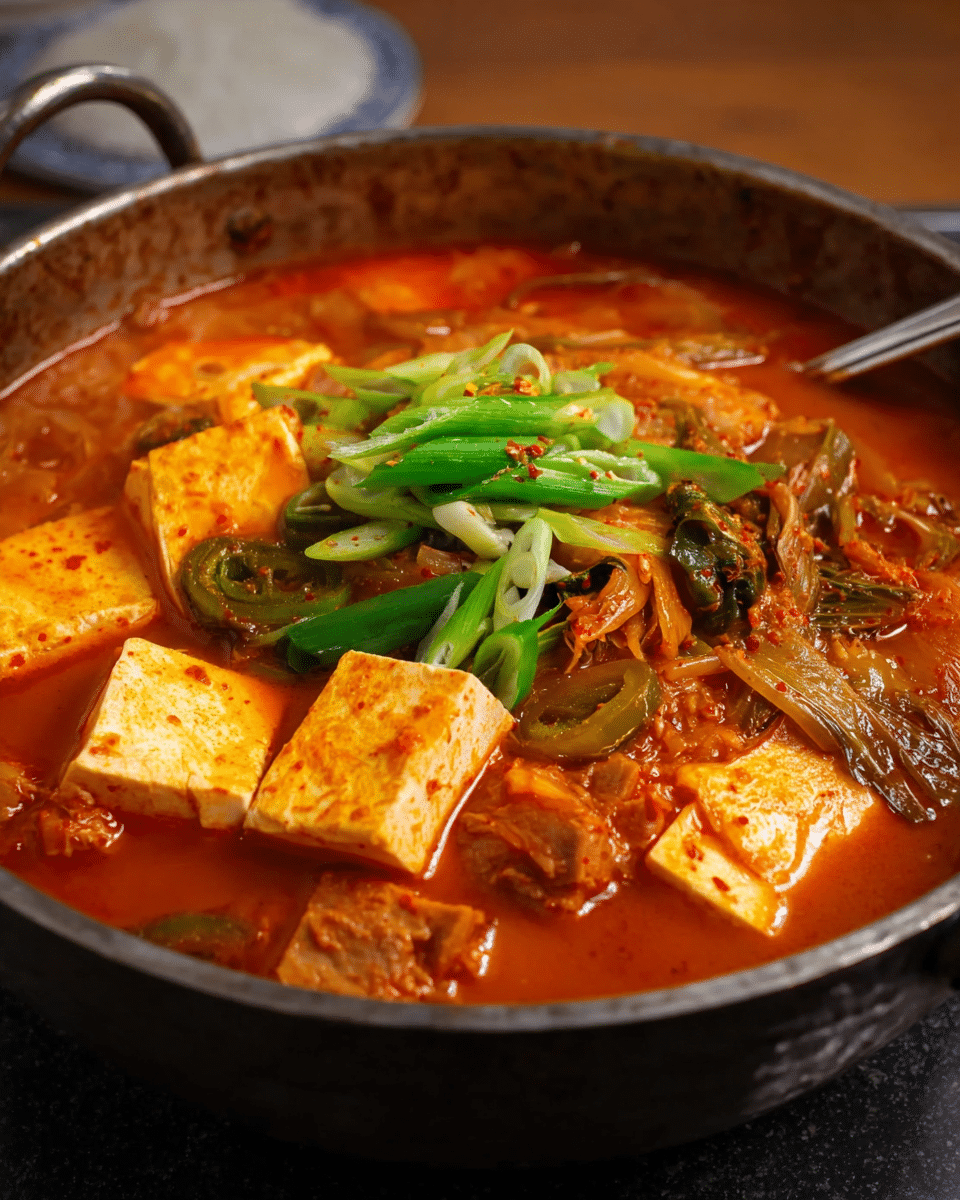Kimchi Jjigae is a beloved and comforting Korean dish known for its rich, spicy, and savory flavors. This hearty stew is made with kimchi, tender pork, and tofu, all simmered in a savory anchovy stock. It’s perfect for those who love bold flavors and want to experience authentic Korean home cooking. The combination of fermented kimchi with pork and a variety of seasonings creates a dish that’s both satisfying and full of depth, ideal for a cold day or a hearty meal.
Full Recipe:
Ingredients
For the Stock:
-
7 large dried anchovies (heads and guts removed)
-
1/3 cup Korean radish (or daikon radish), thinly sliced
-
4×5 inch dried kelp
-
3 green onion roots
-
4 cups water
For the Stew:
-
1 lb kimchi, cut into bite-size pieces
-
1/4 cup kimchi brine
-
1/2 lb pork shoulder (or pork belly)
-
1/2 package tofu (optional), sliced into 1/2 inch thick pieces
-
3 green onions (2 for the stew, 1 for garnish)
-
1 medium onion, sliced (1 cup)
-
1 tsp kosher salt
-
2 tsp sugar
-
2 tsp gochugaru (Korean hot pepper flakes)
-
1 tbsp gochujang (Korean hot pepper paste)
-
1 tsp toasted sesame oil
-
2 cups anchovy stock (or chicken or beef broth)
Directions
-
Make the Anchovy Stock: In a saucepan, add anchovies, daikon radish, green onion roots, and dried kelp. Pour in the water and bring to a boil. Simmer for 20 minutes over medium-high heat, then reduce heat and simmer for another 5 minutes. Strain the stock.
-
Make the Stew: In a shallow pot, add the kimchi and kimchi brine, followed by the pork and sliced onion. Slice 2 green onions diagonally and add them to the pot. Season with salt, sugar, gochugaru, and gochujang. Drizzle sesame oil on top, then pour in the anchovy stock.
-
Simmer the Stew: Cover the pot and cook for 10 minutes over medium-high heat. After 10 minutes, stir the ingredients and add the tofu slices on top. Cover again and cook for another 10-15 minutes over medium heat, allowing the stew to thicken and the flavors to meld.
-
Garnish and Serve: Chop the remaining green onion and sprinkle it on top of the stew. Serve immediately with rice.
Nutrients
Kimchi Jjigae is a rich and flavorful stew, providing protein from pork and tofu, along with beneficial probiotics from kimchi. Here’s an estimated nutrient breakdown per serving:
-
Calories: 300-350 kcal
-
Protein: 25-30 g
-
Total Fat: 18-20 g
-
Saturated Fat: 5-7 g
-
-
Carbohydrates: 15-20 g
-
Dietary Fiber: 3-4 g
-
Sugars: 3-5 g
-
-
Cholesterol: 60-80 mg
-
Sodium: 900-1100 mg
-
Potassium: 600-700 mg
-
Vitamin A: 8-10% of the Daily Value (DV)
-
Vitamin C: 10-15% of the DV
-
Calcium: 6-8% of the DV
-
Iron: 12-15% of the DV
The Heart of Kimchi Jjigae: The Kimchi Base
At the core of Kimchi Jjigae is the star ingredient—kimchi. Fermented vegetables, usually napa cabbage, seasoned with chili pepper, garlic, ginger, and fish sauce, kimchi is a dish in itself. However, when used in Kimchi Jjigae, it takes on a whole new life. The fermented nature of kimchi gives the stew its signature tangy, umami flavor that defines the dish. Over time, as kimchi ferments, it develops a more robust and complex taste, making it the perfect base for a stew that requires a bold, hearty flavor.
Kimchi Jjigae typically calls for well-aged kimchi, which has been allowed to ferment longer. This creates a depth of flavor, making the stew richer and more flavorful. As the kimchi simmers in the stew, its sourness melds perfectly with the savory ingredients, adding both complexity and vibrancy to the dish.
The Role of Pork in Kimchi Jjigae
Pork is another essential ingredient in Kimchi Jjigae, providing rich, savory flavors that balance the sharpness of the kimchi. Pork shoulder or pork belly is commonly used for this dish due to their tenderness and ability to absorb the flavors of the broth. When cooked slowly, the pork becomes tender and juicy, contributing a layer of richness to the stew. The fat in the pork also helps to create a smooth, velvety texture in the broth, enhancing its depth.
The combination of the pork and kimchi in the stew results in a complex flavor profile—savory, fatty, and slightly spicy. As the pork simmers in the anchovy stock, it becomes infused with the seasonings, while the kimchi continues to soften and release its natural tang, making every bite a satisfying experience.
The Importance of Anchovy Stock
A key component of Kimchi Jjigae is the anchovy stock. Anchovy-based broth is commonly used in Korean stews, as it imparts a deep, umami-rich flavor that is essential to the dish. The anchovy stock is typically made by simmering dried anchovies, kelp, and radish, which creates a savory and slightly briny base for the stew. The resulting stock adds a rich depth to the kimchi and pork, blending all the ingredients together into a harmonious and flavorful stew.
The anchovy stock’s delicate fishiness provides a balance to the sourness of the kimchi, while the radish and kelp bring their own subtle flavors, further enhancing the overall taste of the stew. This stock is an important part of creating the authentic flavor of Kimchi Jjigae, as it adds layers of complexity without overwhelming the other ingredients.
Tofu: A Soothing Contrast
Tofu is often added to Kimchi Jjigae for its ability to soak up the rich flavors of the broth while providing a soft, smooth texture that contrasts beautifully with the tender pork and tangy kimchi. The tofu helps to mellow out the dish by offering a neutral flavor that balances the intensity of the kimchi and pork. It also adds a creamy texture to the stew, making each spoonful comforting and satisfying.
Adding tofu to Kimchi Jjigae is not just about flavor but also about nutritional value. Tofu is an excellent source of plant-based protein and adds a healthy dose of calcium and iron to the dish, making it a great option for those looking to include more plant-based ingredients in their meals.
Seasonings and Flavors in Kimchi Jjigae
The seasonings used in Kimchi Jjigae play a vital role in creating its bold and savory flavor profile. Common seasonings include gochugaru (Korean red chili flakes), gochujang (Korean red chili paste), and sesame oil. Gochugaru provides a mild heat and a slight smokiness, while gochujang adds both heat and a touch of sweetness to the stew. These two ingredients are what give Kimchi Jjigae its signature spiciness, as well as its complex flavor.
Sesame oil is another key seasoning, offering a nutty, aromatic fragrance that enhances the overall depth of the stew. Additionally, sugar is sometimes added to balance out the sourness of the kimchi and to harmonize the flavors. The result is a stew that has a perfect balance of heat, sweetness, and acidity, making it both bold and comforting.
Cooking Method: Simmering to Perfection
Kimchi Jjigae is a dish that requires time to simmer, allowing the flavors to meld together and intensify. The stew is typically cooked over medium heat for about 20 to 30 minutes, depending on the thickness of the ingredients and the desired consistency of the broth. During this time, the kimchi releases its juices into the broth, and the pork absorbs the rich flavors, becoming tender and flavorful.
The tofu is added toward the end of the cooking process to prevent it from breaking apart during the long simmering time. Once added, the tofu absorbs the flavors of the broth, becoming a perfect complement to the other ingredients. After simmering, the stew is ready to serve, with the kimchi and pork perfectly melded into the rich, flavorful broth.
Serving Kimchi Jjigae
Kimchi Jjigae is typically served with steamed rice, which helps to absorb the savory broth and provides a neutral base that balances the spice. The dish is often enjoyed as a comforting meal during colder months, providing both warmth and satisfaction. The combination of spicy, sour, and savory flavors makes it an ideal dish for those looking for a hearty, flavorful stew that is both filling and rich in nutrients.
In Korea, Kimchi Jjigae is often served as part of a larger meal, accompanied by other dishes such as banchan (side dishes), pickled vegetables, and kimchi. This gives the meal variety and ensures that there’s a balance of flavors, from spicy to sweet and savory to sour.
The Nutritional Benefits of Kimchi Jjigae
Kimchi Jjigae is not only delicious but also highly nutritious. The dish provides a good source of protein from the pork and tofu, as well as beneficial probiotics from the kimchi. The kimchi’s fermentation process makes it rich in probiotics, which are beneficial for gut health and digestion. Additionally, the vegetables in the stew, such as radish and green onions, provide essential vitamins and minerals, contributing to a well-rounded meal.
The anchovy stock adds omega-3 fatty acids and iodine, which are important for maintaining heart health and proper thyroid function. The addition of tofu further boosts the nutritional value, providing plant-based protein, calcium, and iron. Overall, Kimchi Jjigae is a hearty, nutrient-dense dish that offers both comfort and health benefits in every bite.
Conclusion: A Flavorful Korean Classic
Kimchi Jjigae is a comforting, flavorful, and nutritious dish that has become a staple of Korean home cooking. With its rich, spicy broth, tender pork, and silky tofu, this stew offers a perfect balance of flavors and textures. The dish’s ability to combine the boldness of fermented kimchi with the umami depth of anchovy stock creates a stew that is both hearty and satisfying. Whether you’re looking for a warming meal on a cold day or craving an authentic taste of Korean cuisine, Kimchi Jjigae is sure to deliver.
The complex, layered flavors of Kimchi Jjigae make it a dish worth trying for anyone who enjoys bold, spicy foods or is seeking to explore Korean cooking. The combination of fresh ingredients, fermented kimchi, and tender pork makes this stew a true Korean classic. Perfect for family meals, dinner parties, or simply for those who appreciate the comfort of a flavorful stew, Kimchi Jjigae is a must-try dish that embodies the heart and soul of Korean culinary traditions.






